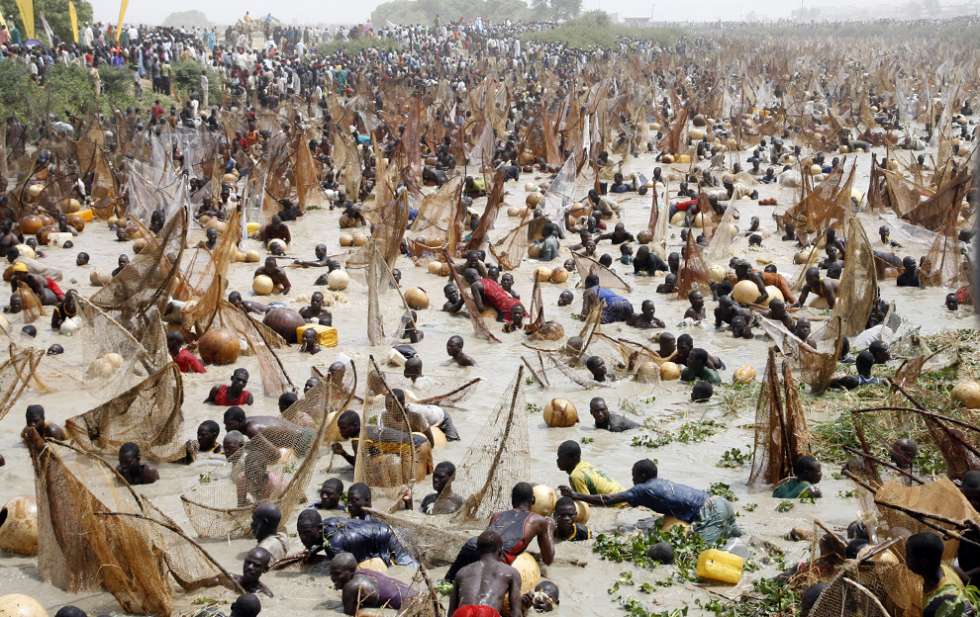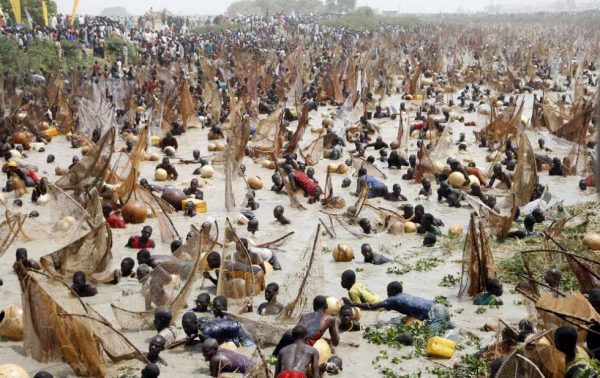Kebbi is a state in northwestern Nigeria. It was created in 1991 from the southwestern half of Sokoto state. Kebbi borders the nations of Niger Republic to the west and Benin Republic to the southwest, and it borders the Nigerian states of Sokoto and Zamfara state to the north and east respectively and Niger state to the south. Kebbi’s area consists of short-grass savanna that is drained southwestward by the Niger River and its tributary, the Sokoto (Kebbi) River. Most of the Kainji Reservoir, formed by the Kainji Dam further downstream on the Niger River, lies in the southern portion of the state.
Read more about Northern Nigeria
Overview of Economic Activity and Ethnic Groups
Agriculture is the most important economic activity, with riverine floodplains producing cash crops of peanuts (groundnuts), cotton, and rice. Subsistence crops include sorghum, millet, cowpeas, and onions. Much of the land in the state is used for grazing cattle, goats, and sheep. The major ethnic groups in the state include the Fulani, Hausa, Dakarki (Dakarawa), and Kamberi. Most of the population is Muslim.
The Capital City: Birnin Kebbi
Birnin Kebbi town is the capital of Kebbi state. It lies along the Sokoto (Kebbi) River at the intersection of roads from Argungu, Jega and Bunza. An early settlement of the Kebbawa, a subgroup of the Hausa. It was captured about 1516 by Muhammadu Kanta, founder of the Kebbi kingdom. Subsequently, it was incorporated into Kebbi, one of the Banza Bakwai (the seven illegitimate Hausa states), which extended over what is now northwestern Nigeria and southwestern Niger. Internal dissension led Tomo, the king of Kebbi, to move his capital from Surame, 60 miles (100 km) northeast, to Birnin Kebbi about 1700.
Sign up to the Connect Nigeria daily newsletter
The town remained the capital of Kebbi until 1805, when it was burned in the Fulani jihad (“holy war”) by Abdullahi dan Fodio, a brother of the jihad leader and later emir of Gwandu. After Birnin Kebbi was incorporated into the Fulani emirate of Gwandu, it was eclipsed in political importance by Gwandu (Gando) town, 30 miles (48 km) east, and as a caravan and riverside market centre by Jega, 20 miles (32 km) southeast, which lay at the head of navigation on the Zamfara River, a tributary of the Sokoto. Ironically, while Argungu (30 miles northeast) became the traditional seat of the king of Kebbi in 1827, Birnin Kebbi served as the Gwandu emirate headquarters after Emir Haliru was inaugurated there in 1906. Birnin Kebbi became the capital of the newly created Nigerian state of Kebbi in 1991.
Although Birnin Kebbi has declined as a river port because of silting as well as political conditions, it now serves as a collecting point for peanuts (groundnuts) and rice and as a major local market centre in millet, sorghum, rice, fish, goats, and cattle. It is the site of a state polytechnic, college and a government rice-research station. Its Hausa and Fulani inhabitants are predominantly Muslims with large pockets of Christian population found also in some Local Government Areas.
Sources:
Britannica
Wikipedia
Featured Image Source: Naija News
Got a suggestion? Contact us: editor at connectnigeria dot com


